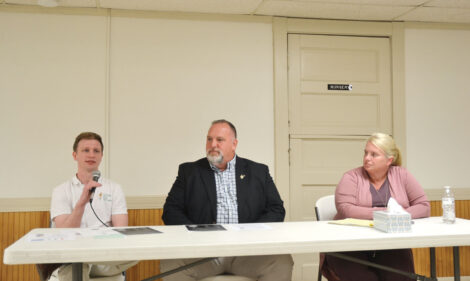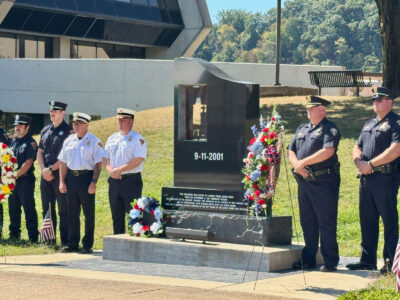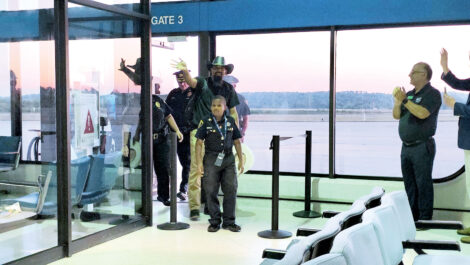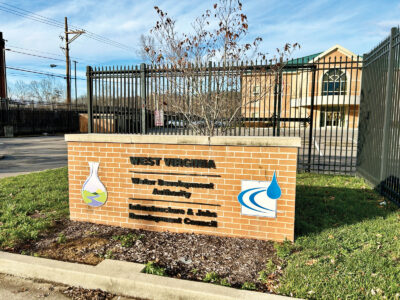Parkersburg Engagement Project talks to local legal representatives
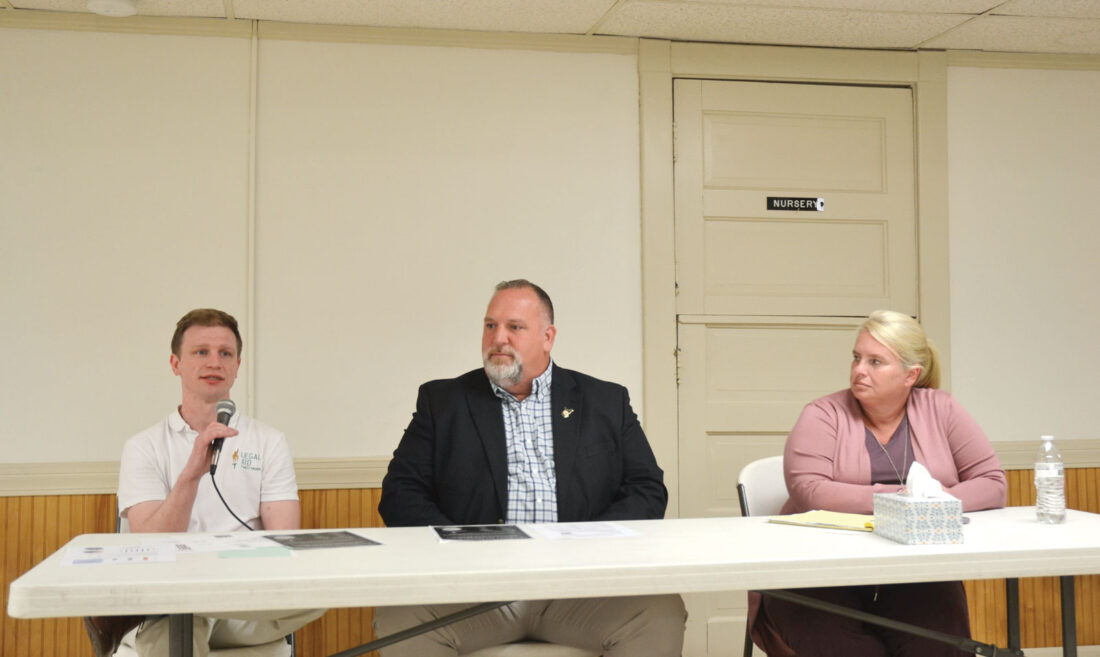
John Williams, supervising attorney for Legal Aid of West Virginia, Mike Pifer, retired Vienna Police Chief and CIT coordinator for First Choice Services, and Jill Fox, assistant public defender, were the guest panel for the fourth session of the Parkersburg Engagement Project’s Substance Use Solutions Series held at the First United Methodist Church on Juliana Street on Thursday. (Photo by Douglass Huxley)
PARKERSBURG – The Parkersburg Engagement Project held its fourth session of the Substance Use Solutions Series on Thursday at the First United Methodist Church on Juliana Street with law enforcement and legal representation as the focus.
Parkersburg City Councilwoman Wendy Tuck said members of local law enforcement were invited to attend but could not due to the “On Your Bumper” tour.
“DJ Daniel, who’s a young man that has a terminal illness, is doing a nationwide tour, and they are swearing him in as an honorary policeman,” Tuck said.
The officers were involved Thursday with greeting DJ at the Mid-Ohio Valley Regional Airport on Thursday evening. Following a special swearing in ceremony today, there will be a community concert with Chris Darlington at 7 p.m. today at Point Park, officials said.
Tuck said another session is being planned to have law enforcement attend.
Thursday’s session included John Williams, supervising attorney for Legal Aid of West Virginia, Mike Pifer, retired Vienna Police Chief and CIT coordinator for First Choice Services, and Jill Fox, assistant public defender.
The group took predetermined questions about the complex challenges surrounding substance use disorders and the criminal justice process.
“We’re seeing more substance abuse cases, and we’re seeing especially overdose cases,” Fox said. “While the Narcan’s helping people with substance abuse issues, officers can give citations for those.”
Pifer said he wasn’t aware that many citations were being issued and questioned the effectiveness of those citations. He said law enforcement is in need of direction.
“The belief that citation triggers something, not necessarily, some type of, you know, punishment… that doesn’t do any good,” Pifer said.
He said there is the need for better training and awareness of resources among officers. “Enhance training for police is very, very important, and knowledge of what is out there,” Pifer said.
Williams stressed the broader impact of substance use disorders saying they don’t just impact the individual.
“It’s the entirety of the family unit that is impacted,” Williams said. “We need to really stop stigmatizing substance use disorder… by stigmatizing them, we’re never going to see an improvement.”
The panel all agreed on the importance of support and empathy.
“When my clients have support… we often see a lot more improvements,” Fox said.
Pifer echoed this sentiment.
“Treat them as you’d like to be treated… there’s good people in bad situations.” Pifer said.
Williams said there are ups and downs with anyone going through addiction and it’s important to be there for them as they’re going through recovery.
“Relapse is part of recovery… following up, consistently, calling them… hopefully at the end, we do get a good result,” Williams said.
The group then took questions from those in attendance with one of the central questions being when to intervene with treatment options–pre-arrest, post-arrest, or after charges have been filed.
“We’ve tried different approaches,” Pifer said. “I don’t think law enforcement is against any of the approaches. We just wanted to make it the most effective thing we can make it. So if it’s more effective post arrest, and it’s court ordered, so be it, if it’s more effective pre arrest, so be it.”
Fox said it was the willingness to participate in treatment programs that determines someone’s success in them.
“There are several programs out there that are available,” Fox said. “It’s the willingness of our client – that’s the most important thing. The clients that I’ve had, the most successful clients, have been ones who have participated in long term programs – nine months or longer.”
The PEP group will have meetings every Tuesday and Thursday night this month at First UMC on Juliana Street. Community members are encouraged to attend and more information about the project and event times can be found at pkbengagementproject.org.
Tuck urged people to visit the website and fill out the questionnaire.
“Your feedback is really important to us to kind of identify what else we need to be asking or what else we need to be doing,” Tuck said.

